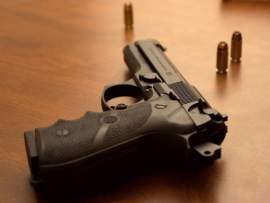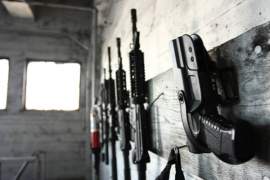
Gun Control Inclusion into Law Overview

The issue of gun control is a subject that is one that is under much dispute and controversy. The opposing factions on the matter fight and argue to prove their points to the best of their abilities, often times gaining enough validity to include or exclude certain legislation movements and their inception into law. Regardless of the debate and heated arguments, the fact remains that there are in fact gun control law is instituted into the legal fabric of the country and they must respected and obeyed.
Those with their allegiance in pro gun control have surely made their impact felt, and the evidence is clear through the time line of the various gun legislation and organizations that have helped push the issue on to writing. Historically speaking, the debate regarding gun control law is almost as old as the United States itself. Ironically, the oldest law regarding firearms is essentially the source of much of the banter from gun rights activist and pro gun control enthusiasts, and is at the center of most of the controversy and debate around the issue of gun control.
Though the law itself protects the citizen's rights to own and possess firearms, the Second Amendment is essentially the first law put in to action that deals with an aspect of gun control; particularly, it deals with the main opposition of the concept, and serves as the modus operandi for the gun rights activists such as the National Rifle Association.
The Second Amendment states in the Bill of Rights, "A well regulated Militia, being necessary to the security of a free State, the right of the people to keep and bear Arms, shall not be infringed." The inclusion of the legislation in to the Constitution serves as a main reason as to why so many staunchly support and fight for the protection of this right. The NRA not only holds it as a constitutional right, but also as a natural human right, further feeding their cause in righteousness. However, there are many controversial aspects to the Amendment itself, that do not necessarily have any thing to do with the content within.
It has been fairly well explored that there can be various interpretations of the law as it is written; furthermore, it contains ambiguous terms that aid in allowing for the various expressions as to what the Amendment actually allows for. The terms that usually are brought to judgment are "Militia" and "free state." Pro gun control advocates will constantly point out that a "Militia" is not only not necessary in this day and age, but the definition of the word is available to a free range of interpretations. An example that is presented is that any private citizen, under this provision of the Constitution, could then have the freedom collect as many firearms and weapons as possible, posing a possible danger to the rest of society.
What stopping an individual from amassing an extensive firearms collection and undertaking an incursion to attack the government; in other words, this is a provision that may essentially, as written, be interpreted as a means for terrorism. Some pro gun control activist will not decisively deny a citizen's right to bear arms, but do stress that a certain amount of control and restriction is dire to insure the safety of the commonwealth.
Another common argument regarding the Second Amendment tests its wording and failure to be exact as a fallacy of time. When the provision was written in to the Constitution, it was under the impression and influence of sentiment rightfully opposed to any further imperialistic reign over the people of the country. The Revolutionary War was still a very fresh scar in the minds of the people, and the healing process was to be aided through legislation.
The Second Amendment is evident to keep in mind the protection against tyranny, and the provision was meant include the protection of the people and commonwealth by their own ability to raise arms and fight for liberty, justice, and freedom. A Militia was needed then to fight for American beliefs of a free state, and bearing arms was crucial for that defense. The Second Amendment is intended to protect a civil liberty that, it main seem a bit outdated, still proves to be a right that a citizen should be allowed to practice without interference from the government. Interpretations of the legislation lead to various disagreements, but it is proven time and time again that the provision is rooted in liberty and justice.
The Second Amendment was most recently challenged in District of Columbia v. Heller, where the interpretation of the legal right was examined and questioned. The main premise of the case was that Dick Anthony Heller was a licensed law enforcement officer for the District of Columbia, and was not allowed by D.C. law to own or possess a handgun to keep at home. The argument was that this handgun ban was therefore, a direct violation of the Second Amendment rights regarding the interpretation of owning firearms for the purpose of self-defense and protection.
The United States Supreme Court would eventually uphold the claim and rule in favor of Heller, stating that it was unconstitutional for D.C. law to prohibit Heller's ownership of a handgun on his own private property because it was for self-defense within the home. An appeal from Parker v. District of Columbia would eventually render the decision that a firearm ban in D.C. is unconstitutional because it infringes the Second Amendment, which protects an individual right to possess firearms for self-defense and protection purposes.
Aside from the Second Amendment being at the core of gun control law debate, two of the most influential and most highly debated pro gun control laws still implemented today are the Gun Control Act of 1968 and the Brady Handgun Violence Prevention Act. The Gun Control Act of 1968 was an immediate result of the assassinations of John F. Kennedy, Robert Kennedy, and Martin Luther King, Jr. The fact that JFK was killed by a mail-order firearm made it apparent that certain regulations needed to be applied to guns and weapons.
The new legislation began to require that all firearm dealers be licensed and that a certain provision of records must be kept regarding all sales and purchases of firearms. The law also prohibited all convicted felons, and individuals with histories of drug abuse or mental disorders. Certain other people were to be listed as prohibited from firearms possession, purchasing, and carrying as well. It is needless to say that mail order sales of shotguns and rifles were also outlawed, which is how Lee Harvey Oswald obtained the weapon that killed John F. Kennedy.
This law is one that has served as the basic federal guidelines implemented across the country, while allowing states to impose their own restrictions as they see fit, as long as they do not violate the Second Amendment. Aspects of this gun control law are still battled today, specifically at the state level, where stricter regulations regarding sales and record keeping are implemented to further restrict firearms.
The Brady Handgun Violence Prevention Act instituted the use of a National Instant Criminal Background Check System that would be headed by the FBI to further insure that no person unqualified would come in to possession or attempt to purchase a firearm illegally. This also implemented a waiting period before the handgun could be delivered as well.
Though pro gun rights activists such as the NRA support the concept of barring criminals the access to firearms, many qualified firearms owners still oppose the legislation because they believe or feel castigated for owning guns because of what criminals have done and are responsible for. Furthermore, the Brady Act also implemented an "Assault Weapons Ban" which prohibited the possession of new semi-automatic weapons, as well as other types of firearms that are considered to be in this category.
Gun rights supporters opposed the bill because many of them would used this category of weapon for simple recreation and sporting purposes and were now required to register them by a certain date, and possibly have to turn them over to the proper authorities.
The argument that pro gun control enthusiasts emphatically would make consisted of pointing out that no civilian would ever require the use of such type of firearm, and the recreation was not a valid reason for possessing or owning this type of weapon. Though both arguments may prove to be valid to a certain extent, it is easy to see where much of the deadlock in reaching an agreement or satisfactory compromise regarding gun control. Gun control law, in more recent years, exists as a way to prevent criminals from accessing firearms and possibly committing more violent crimes.
Gun control activists constantly try to tie in the availability of handguns to national, state, and local crime rates as a main supporting factor behind implementing further restrictions. Though some of the data relating firearms to crime rates is not entirely conclusive or empirical, it still proves an important factor to consider at least the possibility. Regardless of the laws and regulations, the one thing that does seem to be clear is the pro gun rights activists and pro gun control supporters are bound to be in a stalemate of arguments and disputes until definitive signs can be apparent enough to choose a side absolutely.
NEXT: Gun Control Overview





















